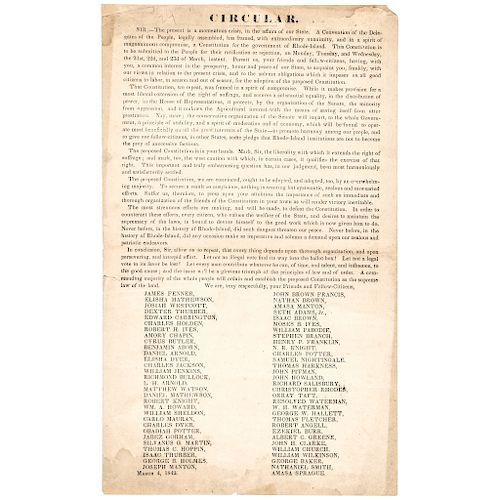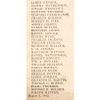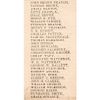March 4, 1842 DORR Rebellion RI. Broadside Political CIRCULAR, Extremely Rare
Lot 286
Categories
Estimate:
$600 - $800
Absentee vs Live bid
Two ways to bid:
- Leave a max absentee bid and the platform will bid on your behalf up to your maximum bid during the live auction.
- Bid live during the auction and your bids will be submitted real-time to the auctioneer.
Bid Increments
| Price | Bid Increment |
|---|---|
| $0 | $10 |
| $200 | $20 |
| $300 | $25 |
| $500 | $50 |
| $1,000 | $100 |
| $2,000 | $200 |
| $3,000 | $250 |
| $5,000 | $500 |
| $10,000 | $1,000 |
| $20,000 | $2,000 |
| $30,000 | $2,500 |
| $50,000 | $5,000 |
| $100,000 | $10,000 |
| $200,000 | $20,000 |
| $300,000 | $25,000 |
| $500,000 | $50,000 |
About Auction
By Early American History Auctions
Oct 19, 2019
Set Reminder
2019-10-19 12:00:00
2019-10-19 12:00:00
America/New_York
Bidsquare
Bidsquare : Historic Autographs-Currency-Political-Americana-Militaria-Guns
https://www.bidsquare.com/auctions/early-american-history-auctions/historic-autographs-currency-political-americana-militaria-guns-4513
326 Lots of Rare, Historic Autographs, Americana, Civil War Era, George Washington, Abraham Lincoln, Black History, Revolutionary War Era, Colonial America, Federal Period, War of 1812, Colonial Currency, Indian Peace Medals & more... Early American History Auctions auctions@earlyamerican.com
326 Lots of Rare, Historic Autographs, Americana, Civil War Era, George Washington, Abraham Lincoln, Black History, Revolutionary War Era, Colonial America, Federal Period, War of 1812, Colonial Currency, Indian Peace Medals & more... Early American History Auctions auctions@earlyamerican.com
- Lot Description
Political
March 4, 1842 Dorr Rebellion Political Broadside in Support of a State Constitution for Rhode Island
March 4, 1842-Dated, Rare Dorr Rebellion Broadside in support of a State Constitution for Changes to the State's Electoral Rules in Rhode Island, Printed "CIRCULAR," Very Fine.
Rare and important historic "Dorr Rebellion" Broadside, printed on light tan period wove paper, measuring 7.5" x 12.5", (Rhode Island). This historic political Broadside stands in support of a State Constitution for Rhode Island. Some marginal edge tone from prior display, well printed in black. It reads, in part:
"Circular. Sir, --The present is a momentous crisis, in the affairs of our State. A Convention of the Delegates of the People, legally assembled, has framed, with extraordinary unanimity, and in a spirit of magnanimous compromise, a Constitution for the government of Rhode-Island. ..." It concludes: "Sir, allow us to repeat, that every thing depends upon thorough organization, and upon persevering, and intrepid effort. Let not an illegal vote find its way into the ballot box! Let not a legal vote in its favor be lost! Let every man contribute whatever he can, of time, and talent, and influence, to the good cause; and the issue will be a glorious triumph of the principles of law and of order. A commanding majority of the whole people will ordain and establish the proposed Constitution as the supreme law of the land."
A printed list of supporters names are in bold typeset at bottom.
The Dorr Rebellion (1841-1842) was an attempt by middle-class residents to force broader democracy in the U.S. state of Rhode Island, where a small rural elite was in control of government. It was led by Thomas Wilson Dorr, who mobilized the disenfranchised to demand changes to the state's electoral rules. The state was still using its 1663 colonial charter as a constitution; it required that voters own land. A later legislative rule required that a man be white and own $134 in property in order to vote.
At first, the middle classes took the lead in seeking change, including Dorr himself. He worked with the Rhode Island Suffrage Association. But the Charter government, controlled by rural elites, fought back hard. For six weeks in 1842, there were two rival governments. The Dorrites, led by self-proclaimed Governor Dorr, pulled back from violence (after their cannon misfired). Only one person died, a bystander killed by accident.
The Charter government compromised. It wrote a new constitution in 1843 that dropped the property requirement for men born in the United States but kept it for foreign-born citizens, and it apportioned more seats in the legislature to the cities. That satisfied the native-born protesters.
The state government had the upper hand; the national government refused to intervene, and Democrats in other states gave Dorr only verbal encouragement. His cause was hopeless-he and five lieutenants were sentenced to life in prison. They were pardoned by the state governor in 1845 after the political agitation had ended. But the state did not drop the property qualifications for immigrant voters until 1888, at a time of increasing immigration.
- Shipping Info
-
Early American provides in-house worldwide shipping. Please contact us directly if you have questions about your specific shipping requirements.
-
- Buyer's Premium



 EUR
EUR CAD
CAD AUD
AUD GBP
GBP MXN
MXN HKD
HKD CNY
CNY MYR
MYR SEK
SEK SGD
SGD CHF
CHF THB
THB














